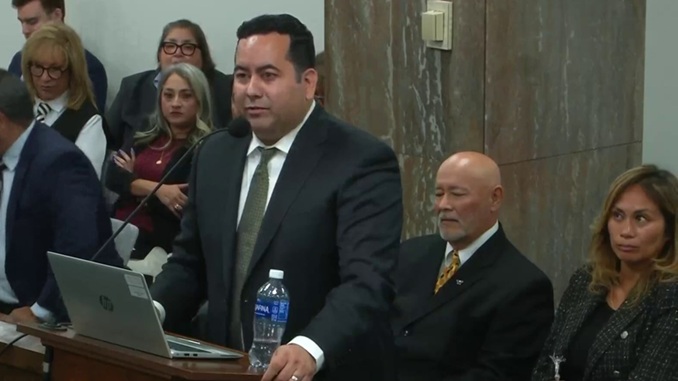
by Jonathan Eberle | Nov 15, 2025 | Education, News
By Jonathan Eberle |
Six Arizona campuses have been named Blue Ribbon Schools, a distinction announced Monday by State Superintendent of Public Instruction Tom Horne and the Arizona Department of Education, recognizing standout academic achievement and sustained student growth.
The schools earning the honor this year include the Academy of Math and Science in Peoria, Chinle Elementary School in Chinle, Empire High School in Tucson, the Maricopa Institute of Technology in Phoenix, Saint John Bosco Catholic School in Phoenix, and Ward Traditional Academy in Tempe.
Horne said the recognition reflects the department’s emphasis on academic rigor and measurable results.
“My primary focus as superintendent is on academic excellence, and these schools can be justifiably proud of this accomplishment because it is based on academic success,” Horne said. “Students and educators should always work toward continuous improvement in academic achievement, and Blue Ribbon Schools demonstrate that when schools lead students into challenging themselves, they will excel academically.”
The Blue Ribbon Schools program, now administered at the state level, highlights campuses that show strong performance on state assessments or demonstrate significant progress in closing achievement gaps among student groups. Established in 1982, the program is open to both public and private K–12 schools nationwide.
Arizona’s newly recognized schools will join a long-running tradition of campuses that exemplify high standards, strong instruction, and a commitment to raising student outcomes across diverse communities.
Jonathan Eberle is a reporter for AZ Free News. You can send him news tips using this link.

by Jonathan Eberle | Nov 12, 2025 | News
By Jonathan Eberle |
A federal court has upheld Arizona’s sex offender registration requirements, marking a significant legal win for state lawmakers who intervened to defend the statutes after Attorney General Kris Mayes declined to do so.
In Doe v. Sheridan, plaintiffs sought to overturn Arizona’s lifetime registration and reporting rules for certain convicted sex offenders. The lawsuit challenged requirements that mandate lifetime inclusion on the state’s sex offender registry, reporting of residential changes, and disclosure of online identifiers. Critics of the law argued the measures were overly burdensome and unconstitutional.
Arizona Attorney General Kris Mayes did not defend the state’s position in the case, prompting Senate President Warren Petersen and House Speaker Steve Montenegro to step in on behalf of the legislature. They argued the laws are essential for transparency and community safety.
U.S. District Judge Stephen McNamee ruled last week to uphold the statutes, finding the state’s registration and monitoring system constitutional. Petersen said the ruling reinforces key safeguards for families.
“When the Attorney General didn’t defend Arizona’s public safety laws, we refused to allow the safety of our children to be jeopardized,” Petersen said in a statement. “This ruling makes clear that tracking convicted sex offenders is not only constitutional – it is necessary to protect families and prevent new victimization.”
Under the ruling, Arizona will continue to require lifetime registration for qualifying sex offenders; require prompt reporting of address and online identity changes; and maintain public tools that allow law enforcement and families to monitor registered offenders.
Petersen called the outcome “a victory for every parent in Arizona,” adding that legislative leaders will continue to act to protect communities when others decline to defend state law.
Jonathan Eberle is a reporter for AZ Free News. You can send him news tips using this link.

by Jonathan Eberle | Nov 11, 2025 | News
By Jonathan Eberle |
State lawmakers will hold a third public oversight hearing in the coming days to examine ongoing concerns surrounding the Arizona Health Care Cost Containment System (AHCCCS), the state’s Medicaid program, as questions persist over fraud, service disruptions, and access to behavioral health care.
Sen. Carine Werner (R-LD4), who chairs the Senate Health & Human Services Committee, announced that the hearing will take place Wednesday, Nov. 12, at 1 p.m. in Senate Hearing Room 1. The session will be open to the public and media, with a livestream expected to be posted on the legislature’s website.
The upcoming hearing comes amid continued fallout from large-scale Medicaid fraud schemes that exploited system vulnerabilities and led to significant billing losses. According to lawmakers, the issue has contributed to widespread service interruptions and difficulties for some patients and behavioral health providers trying to access or deliver care.
Werner has requested testimony from AHCCCS Director Ginny Rountree and senior members of the agency’s leadership team. Legislators are expected to press the agency for updates on enforcement efforts, provider reinstatement processes, and long-term plans to stabilize services. Officials from the Arizona Department of Health Services (ADHS) have also been asked to appear to address questions related to licensing and oversight of behavioral health providers.
“Arizona families and providers deserve honesty, transparency, and meaningful corrective action,” Werner said in an announcement. “The public deserves to know what happened, what is being done now, and how we ensure this never happens again.”
Lawmakers also plan to review AHCCCS’ response to information and document requests issued by the committee. The findings could influence whether legislators pursue additional policy or statutory changes aimed at strengthening oversight and preventing further misuse of public funds. The hearing marks the latest step in a months-long legislative inquiry as state officials continue efforts to restore stability and public trust in Arizona’s Medicaid system.
Jonathan Eberle is a reporter for AZ Free News. You can send him news tips using this link.

by Jonathan Eberle | Nov 11, 2025 | Education, News
By Jonathan Eberle |
A new survey from the Arizona Department of Education (ADE) indicates that the state’s teacher shortage remains severe, with more than 1,000 teachers leaving classrooms since July and thousands of positions still unfilled or covered by temporary staffing arrangements.
According to the data, 763 teachers resigned or failed to report for duty after July 1, and an additional 292 resigned after the school year began, totaling 1,055 departures. The survey, conducted in late August, received responses from 523 of the state’s 629 public school districts and charter schools—an 83% response rate.
The findings show more than 4,200 teaching positions remain vacant statewide. Of those, nearly 30% are being filled by long-term substitute teachers, about 24% are being covered by current educators giving up preparation or planning time, and roughly 23% rely on temporary staffing agencies. Nearly 1,400 of the openings remain entirely unfilled.
State Superintendent of Public Instruction Tom Horne called the situation “intolerable” and urged state leaders to take action. He pointed to long-standing concerns over teacher pay and what he described as insufficient administrative support on student discipline as key factors driving educators out of the profession.
“Teachers have been underpaid for years, and they have also been discouraged by a lack of administrative support for classroom discipline,” Horne said. He noted that he plans to renew his calls for increased pay and stronger discipline policies during his annual address to lawmakers. He also expressed hope that the upcoming debate over the reauthorization of Proposition 123 will include additional funding for teacher salaries drawn from the state land trust, emphasizing that such an approach would not require a tax increase.
Horne said the results reinforce what many educators have been voicing for years. “This survey is disheartening because the solutions are obvious,” he said. “Better pay and robust support from administrators on discipline are vital.”
Arizona has faced persistent teacher shortages for more than a decade, with advocacy groups and education leaders frequently citing low pay, high turnover, and workforce burnout as major challenges. The new survey suggests those issues remain widespread as the school year continues.
Jonathan Eberle is a reporter for AZ Free News. You can send him news tips using this link.

by Jonathan Eberle | Nov 10, 2025 | Education, News
By Jonathan Eberle |
Voters in the Tolleson Union High School District decisively rejected two funding measures last week, signaling a sharp reversal from past election outcomes and raising new questions about public trust in district leadership.
Both a proposed bond and budget override failed by wide margins, marking what state leaders are calling a significant shift in community sentiment. According to Arizona State Representative Matt Gress, who chairs the House Education Committee and co-chairs the Joint Legislative Audit Committee, the margin represents an estimated 40-point swing from the district’s last round of voter-approved measures.
“That kind of reversal doesn’t happen by chance,” Gress said in a statement. “It reflects taxpayers’ deep concern over how their money is being managed and the direction of district leadership.”
The vote comes as the district faces ongoing scrutiny from lawmakers over financial transparency. Gress first requested detailed financial transaction data from Tolleson Union on August 26 following a legislative audit hearing. The district declined to provide electronic records and instead issued an estimate exceeding $26,000 to fulfill the request. A follow-up clarification was sent on September 17, and as of last week the district had not complied.
Gress said the lack of cooperation has only fueled public skepticism. He pointed to delayed responses to official requests and continued planning for an $80 million domed stadium as examples of misplaced priorities, particularly as some governing board members face an active recall effort.
“When a school district refuses to provide basic financial records to the Legislature … public trust deteriorates quickly,” he said. “The Tolleson Union Governing Board should halt any further work on the stadium until transparency is restored and confidence is rebuilt.”
Supporters of the failed measures argued the additional funding was needed to maintain educational programs, address facility needs, and manage enrollment growth. But Tuesday’s results underscore a shifting climate in which voters appear more reluctant to approve additional spending without stronger fiscal assurances.
“The people of Tolleson have made their position clear: accountability must come before new spending,” Gress said. He added that lawmakers will continue to press for the financial records needed to assess how taxpayer funds are being used. School districts often rely on bonds to finance major capital projects and budget overrides to supplement operational funding. The rejection of both measures could force Tolleson Union to adjust spending plans or scale back initiatives in the months ahead.
Jonathan Eberle is a reporter for AZ Free News. You can send him news tips using this link.





